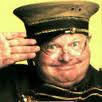Professor Bauerlein brings it home.
Mark Bauerlein, a professor of English at Emory University, has an interesting article in The Chronicle of Higher Education: "How Academe Shortchanges Conservative Thinking:"
The absence of conservative minds from the liberal-arts curriculum and
the off-campus ignorance of them — or worse, treatment of them as hired
hands — are standard features of intellectual life, and they are not
unrelated. When it comes to ideas and values, campuses remain the
foremost site of study, and the curriculum has a certifying effect. It
bears the duty of imparting ideas and writings essential to the
formation of thoughtful, informed individuals. The campus provides a
space in which that can happen, an occasion for learning — not for
advocating or using knowledge, but for acquiring and reflecting upon
it. The ideas included are deemed suitable for academic study, which is
to say they possess enough autonomy to be handled as part of an
intellectual tradition.The division of campus discourse from public discourse has a
discrediting result. If a set of ideas and writings are missing in the
classroom but present in the marketplace or government, we tend to
explain them by their instrumental value. They owe their clout to their
usefulness to business or politics, the reasoning goes, not to
intellectual substance. If the university doesn't put those works and
ideas on the syllabus, they aren't subject to the free analysis and
contemplation that respectable works and ideas merit. When they crop up
off campus, then, they seem to have no independent validity, no import
separate from the interests they satisfy.This is a disabling situation for conservative intellectuals. When a
distinctive intellectual identity emerged 100 years ago in France, it
did so as an adversarial one. People qualified as intellectuals by
acquiring knowledge through education and extending their expertise
into protest, rising above the blandishments of money and position to
represent higher things. What kept them honest and credible was,
precisely, their independence. What kept them authoritative was the
fact that they had developed their opinions in a disinterested setting.Herein lies the plight of conservative intellectuals. They seek to
reflect upon the events of the day, but the ideas they draw upon are
ignored by professors and cheapened by liberal intellectuals. Count the
names Hayek, Russell Kirk, Irving Kristol, etc., on syllabi in courses
on "Culture Society." Tally how often, in left-of-center
periodicals, those names are linked to moneyed interests. The framing
is complete. Heralds of conservatism start and finish in the messy
realm of politics and finance, never rising into the temple of
reflection......The denial of legitimacy creates a distorted intellectual
environment, and everyone suffers. American society, not to mention
students, is poorly served when ideas in the public sphere don't
undergo conceptual, historical, and political analysis in the
classroom. Unfortunately, the curricular attention that conservative
minds and ideas actually gather is reflexive and shallow. It's not even
an adversarial relationship. It's barely any relationship at all.
powered by performancing firefox


No comments:
Post a Comment